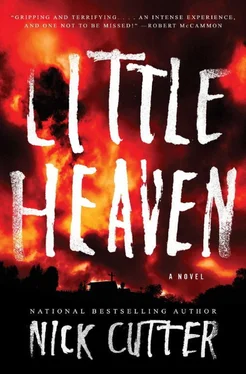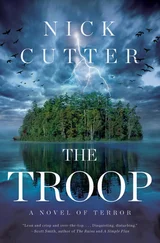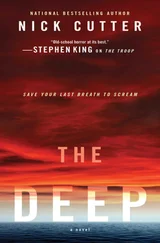One thing was for sure: nobody wanted to step past the gates. The only thing they could do was take cover and wait until morning. Everyone was praying that whatever was in the woods—the things that had killed Mr. Langtree and Mr. Fairweather and Billy and Elton’s dad—wouldn’t enter Little Heaven. It was whispered that they must be afraid of the lights—but with the gasoline dwindling, who knew how much longer the lights would stay on.
Now everyone had split up and made their way either to the warehouse or the mess. The watchers at the gate had whistles in case they saw anything. Nate’s dad wanted to sleep in the warehouse with Maude Redhill and the others, but Nate wanted to stay with the outsiders. He trusted them. Plus, they had more guns. His father gave him a look but said that God would abide.
So they settled in the mess hall. The Englishman was appointed as first watch. The adults quickly fell asleep—even the Englishman. Someone might as well have slipped a knockout drop under their tongues.
But Nate couldn’t sleep. Something awful was happening—had been happening for a while now. Maybe it had been happening since the moment the Reverend stumbled upon this spot in the woods, driven here by the voice of God. What if he’d followed the wrong voice? Sacrilege to think it, his dad would say. Well, maybe his dad was dead wrong, too.
Had all the adults been wrong? Was building Little Heaven their biggest mistake? Even the strongest adults could be misguided—guys like Mr. Fairweather and Mr. Langtree, who Nate was pretty sure were both dead. Dead : before tonight he had never felt the coffin nail finality of that word. He had lost two goldfish and a hamster, Mr. Pips. That was his only experience with death. His mother had flushed the fish down the toilet—a burial at sea, she called it. Mr. Pips got buried in a shoe box in the backyard of a house they had been renting outside Portsmouth. Nate felt bad at losing them, but their deaths had been quick—he woke up to find the fish floating in their bowl before his mom scooped them out with a little skimmer; Mr. Pips died over the weekend when he was away at his dad’s place, so Nate only saw him inside the box, which his mom had padded with cotton batting. They hadn’t screamed like the men had earlier tonight. He had never heard the fear or the wretched bewilderment that their screams had held, either—fish and hamsters just went glub-glub or squeak-squeak , and then, Nate guessed, they died. So it was different. Humans died in worse ways, or at least Mr. Fairweather and Mr. Langtree and Mr. Redhill had.
Nate wondered, if those men could walk it all back—the decision to join Reverend Flesher’s congregation and come here to Little Heaven—would they do it? But it was too late. You can’t relive your life. You couldn’t hop into H. G. Wells’s time machine and zap back to the site of your bad decisions and make a better one. If the decisions you made were stupid ones, well, it wasn’t just you who suffered. No fact seemed clearer to Nate than this: adults were as often wrong as right. And what choice did their kids have but to follow along? Wasn’t that your job as a kid—to tag along and not make noise? And a kid has to believe that those added years should equal added wisdom, right? H-E-double-hockey-sticks no ! Adults could be stupid when it came down to it. When the rubber hit the road, as his mom would say—his mother, who had been stupid herself, getting locked up in jail when Nate needed her most. He hated being mad at her, and angry at his father for his weakness… but his parents’ mistakes had led him here.
It dawned for the first time how difficult and perhaps how fearful it was to be an adult. And Nate was suddenly and selfishly afraid not only for himself now but also for what it seemed he might become.
Nate got up. The one-eyed man snored and rolled over—he actually had two eyes now, even though one of them was glass. His shirt was torn, his wounds clumsily covered with duct tape. The black man was slumped in his chair. Nate thought about shaking him for abandoning his responsibility, but he seemed the sort of person who might punch a boy in the face for waking him up. Nate walked to a window. The compound lay motionless under the security lamps. His eyes flicked left, then flicked ri—
The air soured in his lungs. He tried to back away from the window, but his legs locked up.
His old playmates. They were back. The four of them linked together, hand to hand. Their skin so pale it was nearly translucent. Could nobody else see them?
Eli Rathbone was at the end of the chain this time. Eli couldn’t stand; the others dragged him carelessly, the way a toddler might haul a teddy bear by its arm. His body bumped over the ground. He was so thin: a collection of driftwood lashed into the shape of a boy. Nate could see his hip bones—he never knew how bones might look, really, because they were always covered in enough skin. The only skeletons he’d seen were the cardboard ones hung in the windows at Halloween. But Eli looked too much like those skeletons now.
They approached him quickly; in a heartbeat, they were at the window. Nate tried to call out, but his lips were frozen. A wire ran through his entire body from the tip of his head to his pinkie toe—and that wire tightened, paralyzing him.
Go away was all he could think. Oh please, just go.
Elsa was naked. They all were, but Elsa was different. Nate had never seen a naked girl. Boys, sure. A lot of boys were eager to show their penises to whoever. But girls’ bodies were a riddle Nate hadn’t yet solved. Elsa was wasted but with a big tummy like those starving children in Life magazine. Her tiny breasts were deflated like balloons found behind the sofa three months after the party was over, all wrinkly and saggy. Her… her vagina (as Missus Edwards used to say in sex-ed class) was a stiff trench between her legs, covered in delicate hairs that had gone gray to match the hair on her head. All the kids’ hair had gone gray—no, white , the shocked white of a fright wig. That, along with their bony bodies and pruney skin, made them look ancient—these young-old things dancing to the jangly notes of a flute.
They paraded past the window one by one, grinning at him. The skin of their faces was lined and crepey around their jaws but pulled tight around their sockets so that their eyes bulged out. Their teeth were gray as tombstones. Their pupils were a shade of black that didn’t exist in nature, and blown out to cover their whole eyeballs.
Eli was last. And worst. Nate could see his skull. His skin had worn through at his temples, wearing down the way your toe wears through a cheap Kresge’s sock until there’s only a few fiber fluffs left. His lips were gone: they hadn’t fallen off or been bitten away but had thinned out to the point where they weren’t really there anymore. His gums peeled back from his teeth, which were waaay too big; they looked like the molars the dentist had pulled out of his friend Gregory Betts’s mouth—the dentist gave them to Gregory in a little glass jar and Nate was amazed how long they were with the buried roots visible, like fangs.
Eli pressed his face to the window. The other kids helped prop him up, like a lifeless puppet. The plastic stretched to flatten his features. His face projected inward, threatening to rip through. His mouth stretched into a grin. His eyes were dark and huge; they reached through the plastic somehow, horrid, swallowing, hunting for something soft inside Nate’s chest.
Come out , said a voice in Nate’s head. Come out and play.
Oh no. Nope. No way. That was the last thing on earth he wanted.
And yet…
Читать дальше












